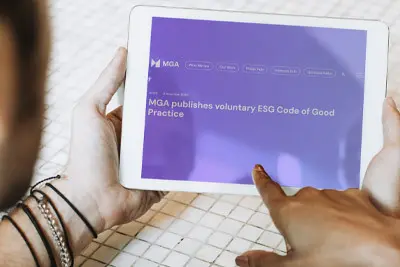In line with the industrial trends for an active engagement in addressing the current social and environmental issues, the Malta Gaming Authority (MGA) has introduced the Environmental, Social and Governance (ESG) Code of Good Practice for the remote gaming sector.
Self-Regulation Instrument
 The ESG Code represents an instrument to help remote gaming companies opt for the best social and environmental practices through a self-regulation process. Albeit voluntary, the ESG process is highly recommended for the sector as the proposed adoption of the ESG practices will demonstrate the commitment of MGA licensees to sustainable operations across all the remote gaming sector stakeholders.
The ESG Code represents an instrument to help remote gaming companies opt for the best social and environmental practices through a self-regulation process. Albeit voluntary, the ESG process is highly recommended for the sector as the proposed adoption of the ESG practices will demonstrate the commitment of MGA licensees to sustainable operations across all the remote gaming sector stakeholders.
During the press conference, MGA CEO Carl Brincat reportedly said:“The MGA has always strived to be at the forefront of regulatory innovation and progress. We have been working not only to supervise the gaming industry, but also to nurture it, to foster a space where operators can thrive, while ensuring that the welfare of society remains paramount. Our ESG Code represents our commitment to this.”
Minister for the Economy, EU Funds and Lands Silvio Schembri reportedly commented: “All businesses should embrace tools to reduce risk and transform successfully, and when it comes to remote gaming, one of the tools is using ESG metrics.’’
Minister added: “The ESG code will serve as an instrument for self-regulation, helping remote gaming companies align with best practices and maintain a position that allows them to effectively meet the evolving expectations of key stakeholders in the sector.”
ESG Code Features
The ESG Code production has been carried out in several stages including the peer review and research stage, stakeholder interviews, and consultation with licensees to ensure that the ESG Code comprehensively addresses social and environmental concerns of the industry stakeholders.
The Code includes three categories, Environmental, Social and Governance, to identify a total of 19 ESG topics and provide the effective guideline for remote gaming companies to secure effective reporting practice.
The MGA will classify these reports into Tier 1 and Tier 2 reports depending on the extent of reporting exercised by the companies. For this purpose, the ESG Code offers a flexible approach for companies to meet the basic standard requirements and choose optional disclosures of their respective social and environmental practices.
No specific targets have been set by the ESG reporting but rather focused on the reporting process itself. The companies submitting reports under this code will be awarded the MGA ESG Code Approval Seal acknowledging that companies demonstrate the commitment to ESG. The seal will differentiate Tier 1 and Tier 2 reports.
ESG Reporting Process
The Code will be submitted on a voluntary basis and will be separated from other ESG disclosures to the regulatory bodies. Submissions will be confidential and available via an MGA online platform. The ESG reporting schedule will follow the financial year reporting and is expected to launch in 2023, with the deadline for submission set for the third quarter of 2024.
Source: “MGA Publishes Voluntary ESG Code of Good Practice”. European Gaming. November 13, 2023.




